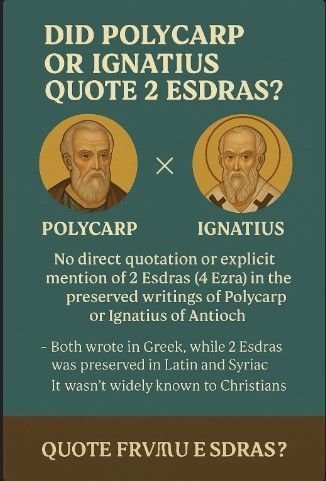🧾 Summary Answer:
There is no direct quotation or explicit mention of 2 Esdras (4 Ezra) in the extant writings of Polycarp or Ignatius of Antioch.
But the situation is worth unpacking further.
🔍 1. What Writings Do We Have?
🕊️ Ignatius of Antioch (~35–107 AD)
-
Wrote 7 epistles while on the way to martyrdom in Rome.
-
Focused on church unity, the authority of bishops, the nature of Christ, and warnings against heresy.
-
His writings are deeply New Testament-focused, especially on Paul’s letters, the Gospels, and basic doctrine.
🔥 Polycarp of Smyrna (~69–155 AD)
-
Best known for his Epistle to the Philippians and the Martyrdom of Polycarp (written later by others).
-
Quotes heavily from the New Testament (especially the Gospels, Paul, and 1 Peter).
-
Emphasizes righteousness, endurance, and sound teaching.
🧠 2. Why No Quotation from 2 Esdras?
a. Language & Circulation
-
2 Esdras was primarily preserved in Latin and Syriac.
-
Ignatius and Polycarp wrote in Greek.
-
There’s no evidence of a Greek version of 2 Esdras available to them during their lifetimes.
-
2 Esdras may not have reached Asia Minor or Syria until later (late 2nd or 3rd century).
b. Canon & Tradition
-
These early church leaders were focused on affirming apostolic teachings—they quoted mostly from texts later canonized in the New Testament.
-
2 Esdras, being Jewish apocalyptic, may not have been viewed as directly useful in doctrinal disputes of the time.
✒️ 3. Did They Allude to Similar Themes?
While neither Polycarp nor Ignatius quote 2 Esdras, they do share thematic concerns found in it:
| Theme | 2 Esdras (4 Ezra) | Ignatius / Polycarp |
|---|---|---|
| Endurance through suffering | Ch. 7, 13:23–24 | Ign. Rom. 4:1 – “Let me be food for the wild beasts” |
| Judgment of the ungodly | Chs. 5–7 | Poly. Phil. 2:3 – “He who raised Him from the dead will raise us too” |
| Reward for the righteous | Ch. 8:52 – “Paradise, the tree of life... rest” | Poly. Phil. 5:3 – “We shall reign with Him if we walk worthy of Him” |
📚 Later Church Use vs. Apostolic Fathers
By the 3rd and 4th centuries, 2 Esdras was being quoted by Christian theologians like:
-
Ambrose of Milan
-
Jerome (included it in the Vulgate, but marked it as non-canonical)
-
Augustine (referred to it on occasion)
But Ignatius and Polycarp wrote too early for 2 Esdras to have become widely available in the Christian East.
✅ Conclusion
-
❌ No evidence that Polycarp or Ignatius quoted or referred to 2 Esdras.
-
📜 They mostly quoted from canonical NT texts, with no known allusions to Apocrypha.
-
🌍 Geographic and linguistic factors likely limited their access to the book.
-
🔥 Later Christian theologians, especially in the West, preserved and referenced it more freely.
We need to be careful when considering this text, why? Because we know at 1 John we were warned that the apostate antichrists were at work. Also the reference to the Messiah reigning for 400 years is just wrong, we know that He will reign forever. Yet give it a read, it will let you know what was in the minds of people during the destruction of the second temple.
